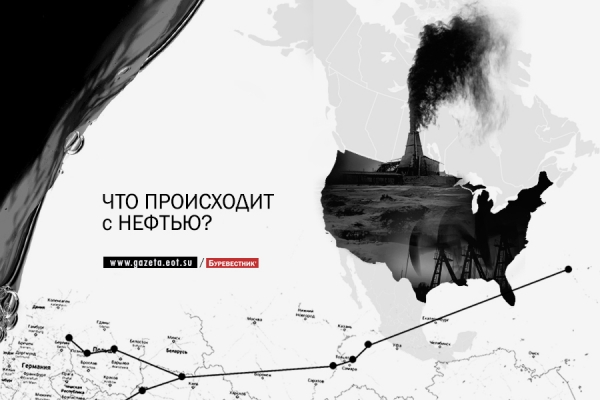
Despite the attempts of the largest exporting countries to settle the situation in the oil market, prices remain at historic lows of the last decade. It seems that the stock prices do not react more on optimistic forecasts, no evidence of a decrease in oil shale mining in the United States.
The main factor that after each attempt to boost the market, beats the oil prices like a tennis ball — these are figures of world production and consumption of “black gold”. The balance is still disturbed, and to count on serious growth of prices there is no point.
By the middle of February the price of Brent oil moved away from the critical value in $ 30 for barrel, having added several US dollars within a few days. The reason for this correction was the statement of the Minister of energy of the United Arab Emirates of Soheila bin Mohammed al-mazrouion what OPEC ready to cut oil production in the near future intend to discuss this issue with other exporters.
A few days later, in Doha held a meeting of representatives from Russia, Qatar, Saudi Arabia and Venezuela. Following the meeting, energy Minister Alexander Novak said: “Russia, Saudi Arabia, Qatar and Venezuela — are willing to freeze oil production at the January level, if other manufacturers will join this initiative”. However, experts described the talks in the Qatari capital useless, as the agreements do not change anything: no freeze means of reducing production. However, even in the fixation of oil production not all agree.
After peregovoriv in Doha, there were statements, which again forced prices down. In particular, Iran did not agree with the idea of limiting production. Oil Minister Bijan Zanganeh has called “ludicrous” the idea. The official explained that, if production of crude oil in Iran falls, it “will bypass much of the neighboring country”. However, he drew attention to the fact that the production of Iran is significantly lower than in Russia and Saudi Arabia.
Later, speaking at an oil and gas conference, IHS CERAWeek, Minister of oil of Saudi Arabia Ali al-Naimi made it clear that his country would freeze on the current rate of extraction is not going to go, and noted that “inefficient producers must leave the market until prices fell to $ 20 per barrel”. Earlier, the head of the Ministry of oil stated that “Saudi Arabia’s economy will cope with the current oil prices”.
Intentions to cut production is not supported by the representatives of the United States. At the same conference, the special adviser on international relations in the field of energy the U.S. Department of state Amos Hochstein called bad idea to freeze production and expressed the opinion that one should not interfere in the process of production and consumption of energy resources. Hochstein also noted that when categorical refusal of Iran from decline, attempts to negotiate don’t already have it.
Venezuela, which, in fact, initiated the talks in Qatar, announced his intention to retry. “An extended meeting of the countries-oil producers within and outside OPEC, which support the freezing of production (oil), could be held in mid-March,” he wrote on his Twitter page, the Minister of energy of Venezuela , Eulogio del Pino. However, expect that re-negotiations will reach a compromise — not worth it, especially considering the sharp rhetoric of the Iranians and the Saudis.
Current developments on the global oil market is very clearly described by Saudi oil Minister Ali al-Naimi: “Many want OPEC stabilized the market at a difficult time, and no one wants to take on the burden of reducing production. Everybody needs money”. I should add that in addition to the loss of money we are talking about the loss of market share, feared every country-exporter. It is obvious that in such a situation, neither player will voluntarily make the first move, since its share will be immediately redistributed as more stable market participants.
Meanwhile, the oversupply of oil is a key reason for maintaining low prices. According to OPEC, the average for 2015 a surplus of oil on the world market had reached 2 million barrels a day. If you believe the forecasts of the Energy of the US administration (EIA), the imbalance of production and consumption of “black gold” will be fixed not earlier than the third quarter of 2017. Prices will recover when you start to decrease the amount of oil in storage. The experts note that the situation today is heavy — there is a massive excess stocks markets. Because of the shortage of tank storage is involved tankers.
For this reason, positive signals like data on the shrinking number of neftevyshek in the US or the decline of U.S. shale oil does not affect the way data on growing oil reserves, which are perceived very painfully. In particular, recent data indicate that commercial oil stocks in the USA again proved to be above expectations, which immediately reflected on the quotes. This suggests that among traders is dominated by the pessimistic mood, and nothing but a sharp supply reduction, or a sharp increase in demand, not able to shake the market. Regarding supply reduction, it is obvious that the observed price war can only end when major exporters would give up a portion of the volume accumulated and stocks begin to decline. The growth of demand in the near future is unlikely. To absorb the current volume of production prevents economic crisis. Negative impact of industrial decline in China, one of the largest consumers of oil, along with the United States and the European Union.
Inflame the situation and intentions of individual countries to increase production despite falling prices. As already noted, is trying to do Iran out of sanctions in the current year and planning to return to desanctions the level of production — that is to splash out on a market of about one million barrels per day. However, skeptics believe that Iran is technically not able to increase these volumes, as this will require additional investments, which are not. However, even if Iran fails to flood the market with oil, it will make the United States. There in recent years, considerable investments were made both in shale and conventional oil. Companies such as Chevron, Royal Dutch Shell and Anadarko Petroleum was actively implementing new projects of oil production on the shelf of the Gulf of Mexico at any cost intend “to beat off” the enclosed means. In fact, according to EIA, the U.S. has been a leader in production growth in 2015, increasing production by almost 0,951 million barrels per day. And, according to forecasts by the Energy Intelligent Group, in 2016 the growth in production will continue.
In addition, as you know, the U.S. Congress in December of 2015 cancelled in effect since 1975 ban on oil exports. American politicians are talking about the intentions of the United States to compete with Saudi Arabia, Russia and other producers. Can the US finally to “fill up” the oil market or not is hard to say, but the growth of domestic production means that middle Eastern oil, which traditionally went to the U.S. market will remain to float in the tanker storage, pressing down the price to new lows.
Given these circumstances, the Western experts do not expect anything good. Recently international rating Agency Fitch has lowered the forecast on oil price from $ 45 to $ 35 per barrel. The energy administration predicts that the average price of Brent crude oil will not exceed 38 $ per barrel. In such assessments, many analysts agree, believing that this year prices will not be able to overcome the range of 40-50 $, formerly known as quite acceptable for mining companies.
For Russia, what is happening in the world of oil does not promise anything positive. Today it is forced to admit in the government. On February 24, Russia’s Finance Minister Anton Siluanov said that to expect an improvement in the external economic environment is not worth it. “We are ready for long-term work in the current conditions,” — said at a meeting of the Federal Treasury Minister. Therefore, the economy, Finance and budget will have “adjusted to new realities”. Siluanov expressed the opinion that the situation now is significantly different from the crises of 1998 and 2008 — then the fall in commodity prices has been less protracted.
Moreover, Russia should participate in the struggle for the preservation of the European and Chinese markets. Today, these segments are targeted, the Saudis and the Iranians. In recent months there have been reports that some European consumers refuse the use of Russian oil in favor of Saudi. In October 2015, it became known that Corporation Saudi Aramco for the first time in the history of crude oil supplies to Poland, which had previously imported oil from Russia. Commenting on this step, the head of “Rosneft” Igor Sechin has accused the Kingdom of dumping.
Obviously, the battle for markets is going to be quite serious, and the period of low oil prices could drag on for years. This year the exporting countries will be seriously challenged to answer which will not all.







